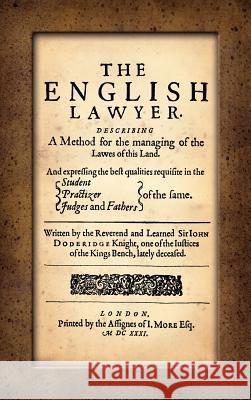The English Lawyer » książka
The English Lawyer
ISBN-13: 9781584775362 / Angielski / Twarda / 2011 / 284 str.
Advice for Aspiring Lawyers in Seventeeth-Century England In this handbook Doderidge, one of the most distinguished legal figures of his age, advises aspiring lawyers. Among other points, such as suggested readings and advice concerning personal demeanor, he urges the student to acquire a solid liberal-arts education that emphasizes subjects with practical application, such as logic and etymology. Regarding the specifics of legal education, he discusses the best methods of study and information on the sources and principles of English law. Reprint of the first edition. As distinguished a jurist as Coke and Bacon, Sir John Doderidge 1555-1628] was a counselor of the King's Bench, a Serjeant for Prince Henry, solicitor-general and a member of Parliament. He was the author of five important works that were all published posthumously. "Of books written about law to instruct students, the most notable, written by a common lawyer, is Doderidge's 'English Lawyer.'" --Holdsworth, A History of English Law V:397-398.
Advice for Aspiring Lawyers in Seventeeth-Century EnglandIn this handbook Doderidge, one of the most distinguished legal figures of his age, advises aspiring lawyers. Among other points, such as suggested readings and advice concerning personal demeanor, he urges the student to acquire a solid liberal-arts education that emphasizes subjects with practical application, such as logic and etymology. Regarding the specifics of legal education, he discusses the best methods of study and information on the sources and principles of English law. Reprint of the first edition.As distinguished a jurist as Coke and Bacon, Sir John Doderidge [1555-1628] was a counselor of the Kings Bench, a Serjeant for Prince Henry, solicitor-general and a member of Parliament. He was the author of five important works that were all published posthumously. "Of books written about law to instruct students, the most notable, written by a common lawyer, is Doderidges English Lawyer." --Holdsworth, A History of English Law V:397-398.











